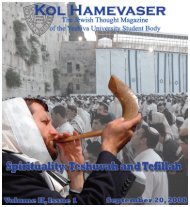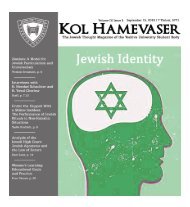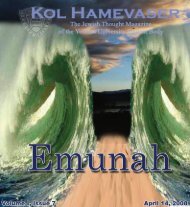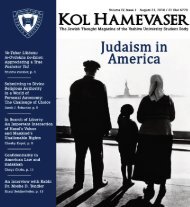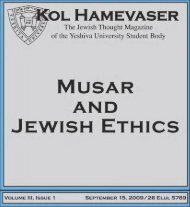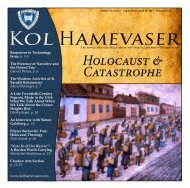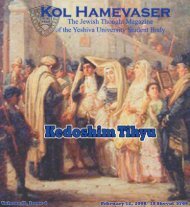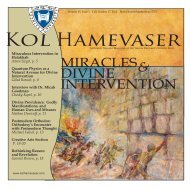You also want an ePaper? Increase the reach of your titles
YUMPU automatically turns print PDFs into web optimized ePapers that Google loves.
BY: Chana Cooper<br />
In a recent interview with <strong>Kol</strong> <strong>Hamevaser</strong>, ii<br />
Rabbi Yaakov Neuberger expressed his opposition<br />
to the institution of yo’atsot <strong>Halakhah</strong><br />
(halakhic advisors on issues of Family<br />
Purity), asserting that allowing women into positions<br />
of halakhic authority would drive a<br />
wedge between female congregants <strong>and</strong> their<br />
communal rabbi. He stated further that rabbis<br />
“are <strong>and</strong> want to be very involved in the full<br />
needs of the community, including women’s issues,”<br />
<strong>and</strong> that it is necessary to “create venues<br />
<strong>and</strong> formats” in which women can feel comfortable<br />
discussing any issue with their rav. iii<br />
I do not wish to address the issue of yo’atsot<br />
<strong>Halakhah</strong> <strong>and</strong> female rabbinic leadership<br />
in this article, but rather would like to focus on<br />
the women-rabbi relationship that Rabbi Neuberger<br />
discusses. In Stern College, the womenrabbi<br />
rift is not a theoretical one. The venues<br />
that he discusses offering opportunities for interaction<br />
between students <strong>and</strong> the rabbinic<br />
leaders of our community are currently very<br />
limited at Stern College, <strong>and</strong> the sense that the<br />
YU’s Rashei Yeshivah are <strong>and</strong> want to be involved<br />
in the needs of the next generation of<br />
women is not strongly felt. While this sentiment<br />
may not be accurate, there is little dialogue<br />
between the rabbinic figures <strong>and</strong> Stern<br />
students to assure them otherwise. The lack of<br />
access to the great rabbinic leaders of Yeshiva<br />
for those on the Beren Campus is a tremendous<br />
loss for students who yearn to learn more<br />
Torah <strong>and</strong> wish for the opportunity to ask them<br />
halakhic <strong>and</strong> hashkafic questions. Additionally,<br />
the distance between the Rashei Yeshivah <strong>and</strong><br />
Stern women is potentially damaging for our<br />
community, which depends upon a bridge of<br />
underst<strong>and</strong>ing between its leaders <strong>and</strong> its constituents.<br />
More than at any other time in history,<br />
Jewish women today have incredible opportunities<br />
for involvement in Torah learning. This<br />
is particularly true in Stern College, where students<br />
are exposed to a remarkable quantity <strong>and</strong><br />
quality of Torah learning. There is a tremendous<br />
desire for growth in learning, as reflected<br />
<strong>Halakhah</strong> <strong>and</strong> <strong>Minhag</strong><br />
Aseh Lekha Rav: i<br />
Opening Channels of Communication to Stern Students<br />
by various recent changes at Stern, including<br />
the creation of the daily Beit Midrash track for<br />
Judaic courses <strong>and</strong> the introduction of a Night<br />
Seder program. Nonetheless, the Torah learning<br />
opportunities available at Stern are still<br />
lacking. While YU’s undergraduate men are<br />
blessed with Rashei Yeshivah who are talmidei<br />
hakhamim of the highest order, Stern students<br />
have minimal opportunities to learn from them,<br />
which is both unfortunate <strong>and</strong>, in my view, unfair.<br />
As an institution, Yeshiva University is<br />
dedicated to the intellectual <strong>and</strong> religious development<br />
of students in of all of its undergraduate<br />
programs, both the men’s <strong>and</strong><br />
women’s colleges. To allow one college max-<br />
“While YU’s undergraduate men are blessed with<br />
Rashei Yeshivah who are talmidei hakhamim of the<br />
highest order, Stern students have minimal opportunities<br />
to learn from them, which is both unfortunate<br />
<strong>and</strong>, in my view, unfair.”<br />
imal access to the greatest Torah resources of<br />
YU <strong>and</strong> the other minimal access is not in accordance<br />
with the principles of our institution.<br />
Providing Stern students little access to<br />
the rabbinic leaders of our community not only<br />
deprives those seeking to learn more Torah, but<br />
also precludes the opportunity for them to seek<br />
advice <strong>and</strong> ask questions from these leaders.<br />
Stern does have mashgihim ruhaniyyim (spiritual<br />
counselors) who are available for students<br />
to turn to for guidance. They are very active in<br />
the Stern community <strong>and</strong> their presence is a<br />
tremendous contribution to the Beren Campus.<br />
However, although their leadership is greatly<br />
appreciated, the desire to speak with the halakhic<br />
<strong>and</strong> hashkafic leaders of the YU community<br />
is still strongly felt. In accordance with<br />
Rabbi Neuberger’s words, the Rashei Yeshivah<br />
should be available to all members of the community,<br />
including women at Stern.<br />
Fortunately, there are a number of occasions<br />
on which Stern women can learn from<br />
the Rashei Yeshivah. Currently, Rav Goldwicht<br />
Opinions<br />
gives a weekly shi’ur on the Beren Campus,<br />
but he is the only Rosh Yeshivah to do so. Additionally,<br />
the Torah Scholarship Series brings<br />
Rashei Yeshivah to Beren for one-time<br />
shi’urim, enabling students to have the privilege<br />
of hearing from these rabbanim at Stern.<br />
These shi’urim are very popular among Stern<br />
students <strong>and</strong> are well attended. Batya Matla<br />
Herzberg, the creator of the Torah Scholarship<br />
Series, developed the program with two goals<br />
in mind: “Firstly, to allow Stern girls the opportunity<br />
to learn Torah from some of the<br />
greatest Torah scholars Yeshiva University has<br />
to offer, <strong>and</strong> secondly, to increase the dialogue<br />
with the Rashei Yeshivah to give students the<br />
sense that our leaders are in touch with all parts<br />
of the community, including Stern.” iv After one<br />
such shi’ur given by Rabbi Herschel Reichman,<br />
Herzberg recalled, students lined up to<br />
ask questions pertaining to many different<br />
areas of Jewish interest, extending well beyond<br />
the topic of the shi’ur. “There is a genuine<br />
thirst for more Torah at Stern <strong>and</strong> the Torah<br />
Scholarship Series is a great way to partially<br />
satisfy that,” said Herzberg. However, these<br />
occasional shi’urim by definition cannot be<br />
very in-depth, <strong>and</strong> thus the amount of Torah<br />
Stern students can learn on these occasions is<br />
limited. The infrequency also means that students<br />
who want to ask religious questions<br />
rarely get the opportunity to do so.<br />
The desire to have access to the rabbinic<br />
leaders of the Yeshiva University community<br />
is not merely driven by the eagerness to learn<br />
from the best Torah resources in YU <strong>and</strong> have<br />
the opportunity to ask them questions on numerous<br />
areas of Jewish life. It is also essential<br />
that rabbinic leaders have a thorough <strong>and</strong> true<br />
underst<strong>and</strong>ing of the perspectives <strong>and</strong> needs of<br />
all of a community’s constituents in order to<br />
render the best possible decisions for that community.<br />
Without much dialogue between the<br />
women of the community <strong>and</strong> the rabbis making<br />
the decisions, their halakhic rulings will<br />
more likely be ineffective or misplaced. Not<br />
only is it important for our rabbis to relate to<br />
“In order to feel comfortable in the religious world<br />
<strong>and</strong> willingly submit themselves to its rabbinic authority,<br />
women must have the sense that the rabbis<br />
truly underst<strong>and</strong> their position, especially when the<br />
issue at h<strong>and</strong> is specifically a women’s issue.”<br />
all parts of the religious community, but it is<br />
also necessary for individuals to feel that their<br />
needs are understood. In order to feel comfort-<br />
Volume III, Issue 7 www.kolhamevaser.com<br />
able in the religious world <strong>and</strong> willingly submit<br />
themselves to its rabbinic authority, women<br />
must have the sense that the rabbis truly underst<strong>and</strong><br />
their position, especially when the issue<br />
at h<strong>and</strong> is specifically a women’s issue. Without<br />
this level of trust, their dedication to religious<br />
practice <strong>and</strong> respect of religious<br />
authority is most likely severely weakened.<br />
There is much to be done in order to increase<br />
the presence of Rashei Yeshivah on the<br />
Beren Campus, affording Stern students more<br />
opportunities for learning Torah, seeking advice<br />
from our leaders, <strong>and</strong> developing a sense<br />
of mutual underst<strong>and</strong>ing between YU’s women<br />
<strong>and</strong> its Rashei Yeshivah. Weekly classes given<br />
by the Rashei Yeshivah similar to Rav Goldwicht’s<br />
would be a very welcome development.<br />
An expansion of the Torah Scholarship<br />
Series would also be well received, so that instead<br />
of giving one-time shi’urim, rabbis could<br />
deliver a whole series of shi’urim in installments<br />
throughout the semester, allowing these<br />
lectures to take place both more often <strong>and</strong> be<br />
more in-depth. Additionally, Stern has many<br />
wonderful shabbatonim which would greatly<br />
benefit from the presence of the Rashei<br />
Yeshivah (currently, a few selected Rashei<br />
Yeshivah come down to Stern only a couple<br />
times a year for shabbatonim). The ideas listed<br />
here are just a few of the ways to increase the<br />
number of interactions of the Rashei Yeshivah<br />
with the women of Stern College, but there are<br />
certainly many more. Hopefully, these changes<br />
will exp<strong>and</strong> the dialogue between the two parties<br />
<strong>and</strong> allow them to work together in minimizing<br />
the women-rabbi rift.<br />
Chana Cooper is a junior at SCW majoring<br />
in Physical Sciences.<br />
i Avot 1:6.<br />
ii Staff, “An Interview with Rabbi Yaakov Neuberger,”<br />
<strong>Kol</strong> <strong>Hamevaser</strong> 3,2 (November 2009):<br />
11-13, at p. 12.<br />
iii Ibid., p. 12.<br />
iv Based on a personal conversation with her.<br />
3



